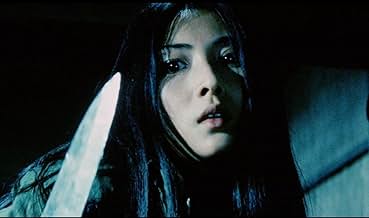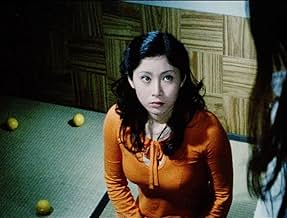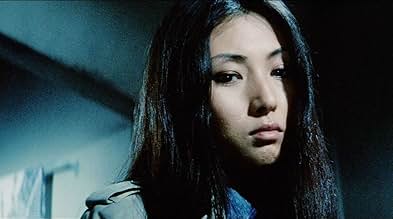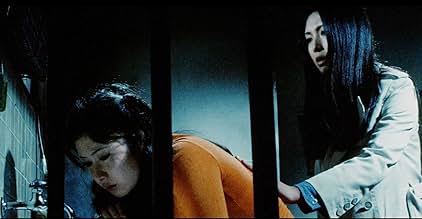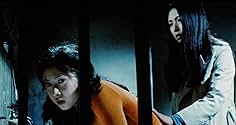AVALIAÇÃO DA IMDb
7,0/10
2,3 mil
SUA AVALIAÇÃO
Adicionar um enredo no seu idiomaMatsu is sheltered by an incestuous prostitute on her run from the police, her ex-prison mate and a cop whose arm she hacked off.Matsu is sheltered by an incestuous prostitute on her run from the police, her ex-prison mate and a cop whose arm she hacked off.Matsu is sheltered by an incestuous prostitute on her run from the police, her ex-prison mate and a cop whose arm she hacked off.
- Direção
- Roteiristas
- Elenco e equipe completos
- Produção, bilheteria e muito mais no IMDbPro
Avaliações em destaque
Third movie of the Female Convict Scorpion series starring Meiko Kaji - and the last directed by Shunya Ito.
Nami Matsushima (AKA 'the Scorpion) is still wanted by the authorities. Lying low, she tries to integrate into city life with a job as a seamstress. However, whilst riding the subway two detectives recognise her and attempt to arrest her. At this point you kinda want to shout out 'No, don't do it!' You just know it won't end well - but all we can do is sit helplessly by as 10 seconds later one cop is dead, and fifteen seconds after that (following a short chase) the other is missing an arm. This leads to one of the most memorable scenes ever, as Scorpion runs through crowded city streets with the cop's bloody arm still handcuffed to her wrist! It's a hell of an opening.
That set-up had me thinking this might be the best one so far. Unfortunately, the rest of the movie struggles to live up to that, and the next 30 minutes or so are a lot slower, There's some sleaze there (including an incestuous relationship between a prostitute and her brother, and a female yakuza boss forcing abortions on the street girls who work for her), and some nice imagery; but for quite a while it plays out more like a drama. When we do eventually hit the point where Scorpion goes full 'avenging angel' it's pretty much a bloodbath. There's also a great prolonged sequence in the city sewers.
Apart from the low pacing for a large part, the problem (if you can call it that) I had here was that some of Scorpion's responses seem a bit... OTT. I mean, we all want to see her kick ass as she dispatches bad guys in increasingly gory ways, but it's not certain that *everyone* she targets deserves the final outcome they get. Still, Ito's visuals involving the multi-coloured neon displays of the city look great, and Kaji is as fantastically effective as ever as the unstoppable Scorpion. Not quite up to the previous two, but still a 7/10.
Nami Matsushima (AKA 'the Scorpion) is still wanted by the authorities. Lying low, she tries to integrate into city life with a job as a seamstress. However, whilst riding the subway two detectives recognise her and attempt to arrest her. At this point you kinda want to shout out 'No, don't do it!' You just know it won't end well - but all we can do is sit helplessly by as 10 seconds later one cop is dead, and fifteen seconds after that (following a short chase) the other is missing an arm. This leads to one of the most memorable scenes ever, as Scorpion runs through crowded city streets with the cop's bloody arm still handcuffed to her wrist! It's a hell of an opening.
That set-up had me thinking this might be the best one so far. Unfortunately, the rest of the movie struggles to live up to that, and the next 30 minutes or so are a lot slower, There's some sleaze there (including an incestuous relationship between a prostitute and her brother, and a female yakuza boss forcing abortions on the street girls who work for her), and some nice imagery; but for quite a while it plays out more like a drama. When we do eventually hit the point where Scorpion goes full 'avenging angel' it's pretty much a bloodbath. There's also a great prolonged sequence in the city sewers.
Apart from the low pacing for a large part, the problem (if you can call it that) I had here was that some of Scorpion's responses seem a bit... OTT. I mean, we all want to see her kick ass as she dispatches bad guys in increasingly gory ways, but it's not certain that *everyone* she targets deserves the final outcome they get. Still, Ito's visuals involving the multi-coloured neon displays of the city look great, and Kaji is as fantastically effective as ever as the unstoppable Scorpion. Not quite up to the previous two, but still a 7/10.
The first three "Female Convict Scorpion" movies, which are the only ones directed by Shunya Ito, are part of the same series but are entirely different entities structurally. The first one is a fairly straight-forward 'women in prison' flick, the second is a piece of great avant-garde film-making, and the third is a slow paced character study. In fact, for most of the movie it is pure Japanese drama, especially the first half, and most viewers would be hard pressed to pigeonhole the movie with just calling it an exploitation film.
Not to say it is completely separate from the other two. Matsu is still her usual quiet self, albeit with a few more lines than normal, and the men are still complete scumbags. She's still running from the cops and using any pointy object she can get her hands on, but she is also keeping a steady job sewing, which is a strange sight to see for any fan of Matsu's previous exploits. She soon finds herself in a situation defending herself and two prostitutes against a local gangs, and violence obviously ensues.
So is it actually any good? For most part, yes, yes it is. The pacing is definitely slower but works well with its new rhythm. It just that it really does not go anywhere with all its character development that fills the first half, and the carnage that ensues does not the fun spirit of its predecessors. Its still a very colorful and stylish film, with some really memorable scenes, but it leaves you wondering why such an otherwise energetic trilogy had to end on a period, and not the exclamation point that its avid fans had all been expecting.
6/10
Not to say it is completely separate from the other two. Matsu is still her usual quiet self, albeit with a few more lines than normal, and the men are still complete scumbags. She's still running from the cops and using any pointy object she can get her hands on, but she is also keeping a steady job sewing, which is a strange sight to see for any fan of Matsu's previous exploits. She soon finds herself in a situation defending herself and two prostitutes against a local gangs, and violence obviously ensues.
So is it actually any good? For most part, yes, yes it is. The pacing is definitely slower but works well with its new rhythm. It just that it really does not go anywhere with all its character development that fills the first half, and the carnage that ensues does not the fun spirit of its predecessors. Its still a very colorful and stylish film, with some really memorable scenes, but it leaves you wondering why such an otherwise energetic trilogy had to end on a period, and not the exclamation point that its avid fans had all been expecting.
6/10
After finishing the Zero Woman series, I was looking forward to the Female Prisoner Scorpion series; both based upon comics by Tooru Shinohara. Unfortunately, I was not able to see them in order, as this is the third in the series.
It starts great as The Scorpion (Meiko Kaji) is escaping from the police. Detective Kondo (Mikio Narita) did manage to get a cuff on her, but she proceeded to cut off his arm and get away. If that isn't bad enough, later on a dog digs up the arm and is seen trotting down the street before finding a place to enjoy his treat.
Scorpion might as well go back to prison as life is no picnic on the outside. First, a local Yakuza Tanida (v) threatens to put her back if she doesn't put out; and then the gang leader gets her when she gets rid of Tanida. But, they don't hold her for long before she escapes and is looking for vengeance.
Soon they are dropping like flies. Some certainly deserved it for wearing garish outfits with shirt collars so big they went all the way to the shoulder. The madam (Reisen Lee) turns herself in to avoid getting killed.
The police arrive at her latest kill and trap her in the sewer. She's in there for a week and the cops find out that a friend (Yayoi Watanabe) has been supplying her with food. (The story O Yuki (Watanabe) and her brother is a subplot that is very interesting, but only incidental to the movie.) They try to burn her out, but this is The Scorpion, and she has some unfinished business.
Not the usual mix of sex and violence, this is a slow tale that is beautiful throughout.
It starts great as The Scorpion (Meiko Kaji) is escaping from the police. Detective Kondo (Mikio Narita) did manage to get a cuff on her, but she proceeded to cut off his arm and get away. If that isn't bad enough, later on a dog digs up the arm and is seen trotting down the street before finding a place to enjoy his treat.
Scorpion might as well go back to prison as life is no picnic on the outside. First, a local Yakuza Tanida (v) threatens to put her back if she doesn't put out; and then the gang leader gets her when she gets rid of Tanida. But, they don't hold her for long before she escapes and is looking for vengeance.
Soon they are dropping like flies. Some certainly deserved it for wearing garish outfits with shirt collars so big they went all the way to the shoulder. The madam (Reisen Lee) turns herself in to avoid getting killed.
The police arrive at her latest kill and trap her in the sewer. She's in there for a week and the cops find out that a friend (Yayoi Watanabe) has been supplying her with food. (The story O Yuki (Watanabe) and her brother is a subplot that is very interesting, but only incidental to the movie.) They try to burn her out, but this is The Scorpion, and she has some unfinished business.
Not the usual mix of sex and violence, this is a slow tale that is beautiful throughout.
The third film in a cycle of brilliant Exploitation movies, and the third masterpiece in a row, "Joshuu Sasori: Kemono-beya" aka. "Female Prisoner Scorpion: Beast Stable" (aka. "Sasori: Den Of The Beast" where I live) of 1973 is a film that differs from its predecessors in some aspects, but that keeps up the great quality. The entire original Sasori series with the wonderful Meiko Kaji stands out as the absolute highlight in WIP cinema, and all of the films, especially the first three, uniquely combine Exploitation and Art-house cinema like no other movie does. "Beast Stable" is the third, and second-to-last "Sasori" film with Meiko Kaji, the last one to be directed by genius director Shunya Ito and, in my opinion, the greatest of them all. The first film "Joshuu 701-gô: Sasori" of 1972 is an absolute masterpiece of Exploitation cinema and simply THE Definition of Exploitation-Art. In the equally brilliant first sequel, "Joshuu Sasori: Dai-41 zakkyo-bô" Ito added more surrealism and symbolism. The third "Sasori" film, "Beast Stable" keeps up the surrealism (allthough not quite to the same extent as the second), and features even more social criticism than its predecessors. Topics like poverty, forced prostitution and the exploitation of the poor are central themes of the movie.
This third "Sasori" film is ingenious and sublime in all aspects and arguably the greatest of the, generally brilliant, cycle (to me it's this one, with the first one as a close second). Once again, "Best Stable" is both very artistic and very Exploitation-like. The visually stunning film features an enormous amount of brutal violence and sleaze again, as well as sequences of enormous surrealistic beauty. The stunningly beautiful Meiko Kaji is once again brilliant in her role of Nami Matsushima (aka. Sasori). I absolutely worship this wonderful actress, and I'm sure I'm not the only one to do so. The rest of the performances are also great, especially Mikio Narita is great as a police Inspector who is obsessed with catching Sasori. The musical score is the same throughout all three films, with "Urami-Bushi", sung by Meiko Kaji herself, as the main theme, which is great, since the score is, simply put, pure perfection. As its predecessors, "Beast Stable" is a true gem and must-see for any fan of cult-cinema.
This third "Sasori" film is ingenious and sublime in all aspects and arguably the greatest of the, generally brilliant, cycle (to me it's this one, with the first one as a close second). Once again, "Best Stable" is both very artistic and very Exploitation-like. The visually stunning film features an enormous amount of brutal violence and sleaze again, as well as sequences of enormous surrealistic beauty. The stunningly beautiful Meiko Kaji is once again brilliant in her role of Nami Matsushima (aka. Sasori). I absolutely worship this wonderful actress, and I'm sure I'm not the only one to do so. The rest of the performances are also great, especially Mikio Narita is great as a police Inspector who is obsessed with catching Sasori. The musical score is the same throughout all three films, with "Urami-Bushi", sung by Meiko Kaji herself, as the main theme, which is great, since the score is, simply put, pure perfection. As its predecessors, "Beast Stable" is a true gem and must-see for any fan of cult-cinema.
This is Shunya Ito's final entry in the FEMALE CONVICT SCORPION series, starring the great Meiko Kaji. The series, based on a Japanese manga, follows the exploits of a woman unjustly imprisoned, brutalized by guards and fellow inmates, who defends herself with such aplomb, she becomes a jail-house legend. The other convicts nickname her Sasori, which means Scorpion. Over the course of two films, she escapes to wreak vengeance against the man who got her busted, is sent back for his murder, and escapes again; the second film ends with Sasori on the loose.
This, the third film, focuses on Sasori's life as a fugitive outside the walls. In an eye-opening first scene, Sasori evades detectives on a subway train; she comes out of it handcuffed to one of the detectives' arms, but not the rest of him. She flees to a slum which consists of a red-light district run by a forced-prostitution ring and a residential area made up of a mud street and shacks, where she is put up for the night and befriended by a lonely prostitute named Yuki. We soon discover that Yuki gives of herself on a nightly basis to her brain-damaged brother, who she keeps locked in a closet. Sasori tries to lead a normal life, taking a job as a seamstress and renting her own apartment, but she and Yuki soon meet again and are both embroiled in a plot that involves the Cruella De Ville-from-hell madam who runs the prostitution ring and the detective from the subway (Mikio Narita, a regular in Kinji Fukasaku films), who by God wants his arm back.
What follows is an atmospheric noir/horror yarn--it takes elements from both and uses them well--that applies Ito's flair for the visual to a mood that is different from the first two SCORPION films, yet bears the same unmistakable signature. A scene involving lit matches falling into a sewer tunnel is especially beautiful. Ito's use of sound, like when Sasori is incessantly scraping the handcuffs with the arm against a tombstone in an attempt to free herself, is as effective here as ever. He also employs silence more than usual, as if by virtue of a newly honed minimalism. This goes along with the relatively subdued tone of the first section of the film, which allows space to explore Sasori's and others' characters. Things pick up by the end, though it's all handled with a dreamier rhythm than the previous films. This is an asset. Each of the three films has its own style, I realize now, and seeing this one made me go back and watch the first, appreciating it more than before.
Meiko Kaji gives her usual amazing performance as Sasori, emoting silently, standing or moving or pouncing or maiming with a grace that switches seamlessly between human and animal. The pathos present in all three films is largely due to the human side of this grace, which never inhibits the films' darker aspects. Reportedly, Kaji, who did one more SCORPION film after this one, had as much to do with developing the character for film as Ito, not only in her performances, but off-camera as well. This film is a worthy swan song for the collaboration. Very Japanese, very seventies, very much something else entirely.
This, the third film, focuses on Sasori's life as a fugitive outside the walls. In an eye-opening first scene, Sasori evades detectives on a subway train; she comes out of it handcuffed to one of the detectives' arms, but not the rest of him. She flees to a slum which consists of a red-light district run by a forced-prostitution ring and a residential area made up of a mud street and shacks, where she is put up for the night and befriended by a lonely prostitute named Yuki. We soon discover that Yuki gives of herself on a nightly basis to her brain-damaged brother, who she keeps locked in a closet. Sasori tries to lead a normal life, taking a job as a seamstress and renting her own apartment, but she and Yuki soon meet again and are both embroiled in a plot that involves the Cruella De Ville-from-hell madam who runs the prostitution ring and the detective from the subway (Mikio Narita, a regular in Kinji Fukasaku films), who by God wants his arm back.
What follows is an atmospheric noir/horror yarn--it takes elements from both and uses them well--that applies Ito's flair for the visual to a mood that is different from the first two SCORPION films, yet bears the same unmistakable signature. A scene involving lit matches falling into a sewer tunnel is especially beautiful. Ito's use of sound, like when Sasori is incessantly scraping the handcuffs with the arm against a tombstone in an attempt to free herself, is as effective here as ever. He also employs silence more than usual, as if by virtue of a newly honed minimalism. This goes along with the relatively subdued tone of the first section of the film, which allows space to explore Sasori's and others' characters. Things pick up by the end, though it's all handled with a dreamier rhythm than the previous films. This is an asset. Each of the three films has its own style, I realize now, and seeing this one made me go back and watch the first, appreciating it more than before.
Meiko Kaji gives her usual amazing performance as Sasori, emoting silently, standing or moving or pouncing or maiming with a grace that switches seamlessly between human and animal. The pathos present in all three films is largely due to the human side of this grace, which never inhibits the films' darker aspects. Reportedly, Kaji, who did one more SCORPION film after this one, had as much to do with developing the character for film as Ito, not only in her performances, but off-camera as well. This film is a worthy swan song for the collaboration. Very Japanese, very seventies, very much something else entirely.
Você sabia?
- CuriosidadesReferences ghost stories of old Japan on demon folklore; the story of Tsuna Watanabe battling a demon and severing his arm, and the story of a brother and sister from a forgotten village committing incest as a means of supporting each other. This is the cinematic world Shunya Ito wanted to create for this installment of the Scorpion series.
- Citações
Yuki Nakagawa: That's right. I'm pregnant. It's my brother's baby!
- ConexõesFeatured in Shunya Ito: Birth of an Outlaw (2016)
Principais escolhas
Faça login para avaliar e ver a lista de recomendações personalizadas
- How long is Female Prisoner Scorpion: Beast Stable?Fornecido pela Alexa
Detalhes
- Data de lançamento
- País de origem
- Idioma
- Também conhecido como
- Female Prisoner Scorpion: Beast Stable
- Empresa de produção
- Consulte mais créditos da empresa na IMDbPro
Contribua para esta página
Sugerir uma alteração ou adicionar conteúdo ausente

